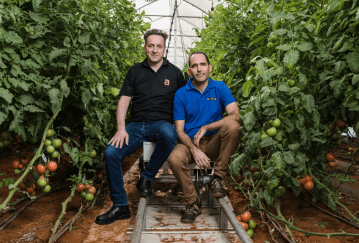Arugga, a startup working on robotic pollination for indoor farming setups, has raised $4 million in pre-Series A funding.
The round was led by Cresson Management, with Biobest Group, Terra Venture Partners, Equicelar, and Smart Agro among the other investors to take part. The deal brings Arugga’s total funding to date to $6 million.
Founded in 2017 and based in Kfar Monash, Israel, Arugga is developing robotic solutions to monitor individual plants grown in indoor settings such as greenhouses. Its initial R&D and product development has focused on robotic methods of pollination that can replace the role fulfilled by bees in outdoor agriculture – and the painstaking manual methods used indoors.
According to Eytan Heller, Arugga’s co-founder and vice president of business development, the startup’s robots use a combination of cameras and artificial intelligence to identify tomato flowers that are ready for pollination.
An air nozzle system sprays a calibrated pulse of air on the selected flowers, ‘shaking’ them to replicate the buzz pollination used by certain species of bees.
The robot moves autonomously down the row of tomato plants on a standard pipe-rail cart, repeating the process.
“Generally speaking, our solution is non-contact, which minimizes risk of viruses being transmitted between plants by workers or bees,” Heller told AFN.
“There is some fear among growers in the US and Canada from tomato brown rugose fruit virus being spread by bees. Several large growers in North America are now looking at alternatives. But when considering manual pollination, it is expensive and inefficient, and we are seeing quite significant added yields for our robots versus manual pollination.”
Other advantages that Arugga’s technology has over the humble bumblebee include its ability to work effectively under artificial lighting – as well as in extreme warm or cold temperatures, which have a significant negative impact on the insects’ pollination performance, Heller said.
“Our solution can [also] be monitored in order to verify successful pollination. We are able to share data and heat maps with growers, showing pollination trends,” he added.
PowerPollen’s ‘on-demand’ pollination tech could make bees’ lives easier – read more here
Arugga offers its technology on a leasing model, with growers paying the startup a monthly fee per hectare for the robots plus tech support.
Pilot schemes using Arugga’s robots in Israel, Australia, and the US have demonstrated results “at least as good” as both bee-based and human-enabled pollination, according to Heller, with yields improved by 1% to 5% compared to the insects and up to 15% versus manual pollination.
The next steps for Arugga include further development of its robotic solutions – including what Heller refers to as a second, “beyond pollination” module – as well as additional trials in the US and Canada. It has recently entered into an agreement with investor Biobest to distribute its tech in those two countries. The pre-Series A funding will also be used to hire talent for the startup’s R&D, marketing, and customer support teams.
“We are most likely to start [Series] A-round discussions with investors before the end of this year. The main purpose [of that fundraising] is to accelerate market penetration and release additional modules,” Heller said.
Comment? News tip? Story idea? Email me at [email protected] or find me on LinkedIn and Twitter





